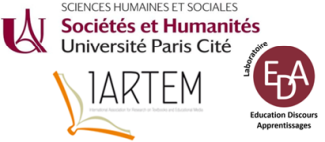This presentation explores the educational potential of repurposing cinematic profession-based fiction in an online English for Specific Purposes (ESP) course to foster critical thinking skills. Aimed at first-year economics and management students, the course integrates tasks aligned with the Common European Framework of Reference (CEFR) and its 2018 Companion Volume (CEFR/CV), which emphasise language use “directed towards enabling learners to act in real-life situations, expressing themselves and accomplishing tasks of different natures” (Council of Europe, 2018: 27) with no predetermined outcome. This definition echoes the assessment of critical thinking in educational contexts, where instructors are encouraged to refer to “authentic, real-world problem contexts” (Lai, 2011) which “should have more than one plausible or defensible solution” (Moss & Koziol, 1991 in Lai, 2011: 39). Our task design incorporates the CEFR/CV's mediation competency and its descriptors, which, we argue, resonate with key principles of critical thinking.
In the realm of teaching Languages for Specific Purposes (LSP), we posit that cinematic profession-based fiction serves as an ideal creative text to encourage mediation, as it “seamlessly connects lexis, actions, places, historical events, technical details, behaviours, mindsets, problems and plot” (Van der Yeught, 2018: 114). Despite being traditional media, films can become potent educational resources through instructors' selective curation, scene choices, and extract editing.
LSP researchers emphasize the importance of preparing students to “function adequately in the target professional environment at socio-professional level” (Isani, 2011: 35), highlighting the non-negotiable role of behaviour in the workplace and in LSP. This perspective echoes the discipline-specific nature of critical thinking, and the idea that it should allow learners' appropriation of standards and values embodied in a discipline (Paul, 1992 in Lai, 2011: 14).
Tasks in our course focus on ethically charged questions related to the banking and finance field, as well as more general moral and ethical issues which students can relate to. This approach acknowledges the often-limited professional experience of undergraduates, engaging them in broader moral and ethical discussions. We aim to leverage broader experiences, particularly those related to dishonesty, hiding, or distorting the truth, to encourage critical reflection on the depicted professional field. The ethical and moral questions serve as a pivotal junction between domain-specific and general critical thinking skills, also aligning with the CEFR/CV's mediation strategies which emphasise drawing on experiences or previous knowledge to explain new concepts (Council of Europe, 2018: 128).
Given the parallels between mediation and critical thinking, we contend that tasks encouraging mediation concurrently promote critical thinking: students analyse and evaluate the issues depicted in profession-based fiction and lived by the characters, drawing connections to personal experiences, emotions, and their peers' perspectives. This serves as valuable preparation for the workforce (Lai, 2011: 41), yet presents no tangible consequences or risks to students, and aligns with the emphasis on “work ethic” and “conscientiousness” as Intrapersonal Competencies from the National Research Council 21st Century Competencies (2012).
Incorporating digital and information literacy questions, with a focus on issues like online scams, addresses students' familiarity with the topic. This inclusion not only promotes other 21st century skills alongside critical thinking, but also allows students to complement film resources with personal media practices as evidence for their arguments, as they collate information from various sources (Council of Europe, 2018: 110) and act as mediators.
The presentation will showcase task design examples and students' written interactions on the Moodle platform's discussion forums, highlighting how considering mediation characteristics fosters both mediation between students and critical thinking regarding the world of work in general, and the banking and finance field in particular. A content analysis of student productions among the course's 85 participants will underscore the intersections between mediation and critical thinking, demonstrating how questioning first-year students on broad ethically acute issues can develop their reflection on more domain-specific questions. The presentation will conclude with suggestions for similar approaches in other LSP fields such as law, police, or medical studies.
Council of Europe. (2018). Common European Framework of Reference for Languages: Learning, Teaching, Assessment. Companion Volume with New Descriptors. Council of Europe. https://rm.coe.int/cefr-companion-volume-with-new-descriptors-2018/1680787989
Isani, S. (2011). Developing Professional Cultural Competence through the Multi-layered Cultural Substrata of FASP: English for Legal Purposes and M. R. Hall's The Coroner. Cahiers de l'APLIUT, 30(2), 29–45. https://doi.org/10.4000/apliut.1497
Lai, Emily. (2011). Critical thinking: A literature review. Pearson's Research Report. 6.
National Research Council. (2012). Education for life and work: developing transferable knowledge and skills in the 21st century. (J. W. Pellegrino & M. L. Hilton, Eds.). Washington, DC: National Academies Press.
Van der Yeught, M. (2018). FASP, the FASPian Paradox and Specialised Encyclopaedias: Highlighting FASP Relevance in Learning/Teaching Specialised Languages. ILCEA, 31. 112-119. https://doi.org/10.4000/ilcea.4684

 PDF version
PDF version
